Mariano & Pace Encourage Female Engineering Students: "You Too Can Succeed!"
August 29, 2017
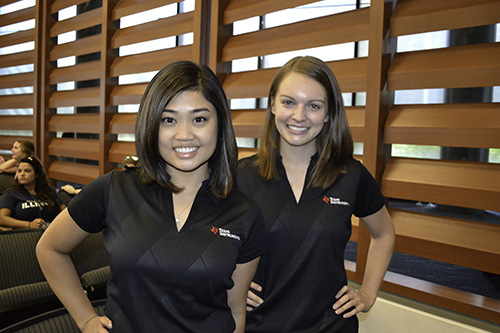
Paula Mariano and Molly Pace, keynote speakers at this year's WIE Orientation.
On August 22–24, two rising stars at Texas Instruments (TI) were back at their Alma Mater for the Women in Engineering (WIE) Freshman Orientation, an event designed to give incoming female engineering students a jump start on their semester and community building. Since one of the program’s objectives was for older and wiser women to impart wisdom to the rookies, these two recent (May, 2016) ECE (Electrical and Computer Engineering) graduates, Paula-Angela Mariano and Molly Pace, were the Keynote Speakers for the event, plus taught a workshop related to internships with TI. The two were on hand to share not only about their triumphs, but their somewhat rocky beginnings; to recommend resources that helped them overcome challenges they encountered; and to pass on some sage advice about how to not just survive but thrive at Illinois. Their main goal? To encourage their younger sisters that they, too, would someday be proud Engineering graduates.
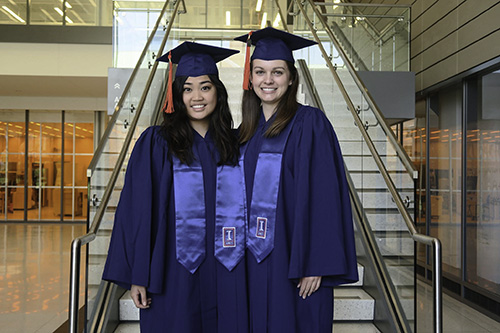
Paula Mariano and Molly Pace in the ECE Building during Graduation 2016. (Image courtesy of Paula Mariano).
While both ladies are currently very passionate about electrical engineering, it wasn’t necessarily love at first sight. For example, Mariano ended up in ECE via a rather circuitous route. Admitted to Illinois’ Department of Nuclear Engineering, she discovered early on that she had chosen the wrong discipline. “After the first semester, I wasn’t really feeling it,” she acknowledges. So during her second semester, she explored her options to transfer to a different engineering field.
Proactive about finding her niche, she started sitting in on other lectures. The first one she attended was in ECE, and the professor listed different areas of focus one could go into. “One thing I liked about electrical engineering,” she reports, “was that it’s such a wide discipline, that you could go into different areas and see what better suits you. Maybe at some point I would want to learn a little more in a different area. It’s just so wide that I could apply anything I learned from the U of I into a different area.”
Luckily, while auditing those classes, she discovered her passion was electrical engineering. “After that first lecture, I attended several others during that month, and I started doing the questions that he would ask up on the screen on my own too. Most of those were circuits.” She reports beginning to understand those and “kind of getting into problem solving that way. I think that’s what first made me interested in electrical engineering." What she does now at Texas Instruments applies that macro circuit knowledge that she learned into the microscopic scale as a Test Engineer.
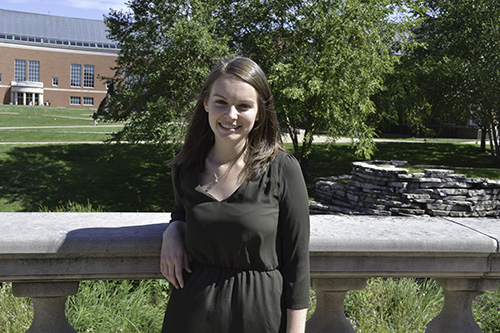
Molly Pace on the south portico of the Engineering Hall during the second day of the WIE Orientation.
In high school, Pace hadn’t really known that much about electrical engineering besides learning about Ohm's law in physics (it defines the relationships between power, voltage, current, and resistance). But because she liked math and science, she settled on engineering, and it was "up in the air between chemical engineering and bioengineering."
So how'd she end up in ECE? It was sort of a dare. Her sister's boyfriend at the time, who was in ECE, had told her she wouldn't like it, and it would be really tough. To the implied slight, 'You can't handle it; you're a woman!" she reports, "I was not happy about that; I didn't like that," she continues, "so I was like, ‘You know what, I did like Ohm's law. I'm going into ECE!’" So she did, just to prove him wrong. And prove him wrong she did, when in spring of 2016, she graduated with honors from one of the top engineering schools in the country. And she now works at TI as a failure analysis engineer, using skills she learned in school to pinpoint the electrical and physical failure on TI parts, either from within TI or from their customers. Her job? Find out what went wrong and spread the information so it doesn’t happen again.
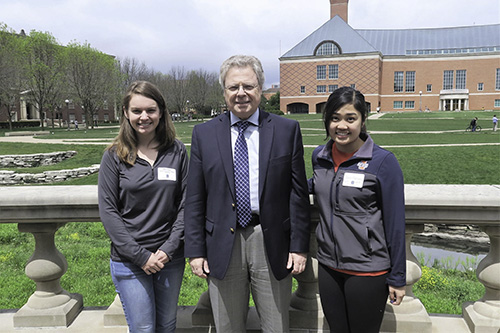
Left to right: Molly Pace, Andreas Cangellaris, Dean of the College of Engineering, and Paula Mariano during the “Student Leaders Cookout” in the Spring of 2016. (Image courtesy of Paula Mariano.)
The two women’s tenure at Illinois was not without some pitfalls. For instance, both discovered early on that the degree of effort they had expended in high school would no longer suffice, but that they were going to have to diligently apply themselves.
For instance, Pace acknowledges being a bit "cocky" when she showed up on campus, but she soon discovered that operating in her high school M.O. because she used to breeze right through courses, wasn’t going to cut it. When the first midterms rolled around, she discovered that she was going to have to change her mindset—and her study habits.
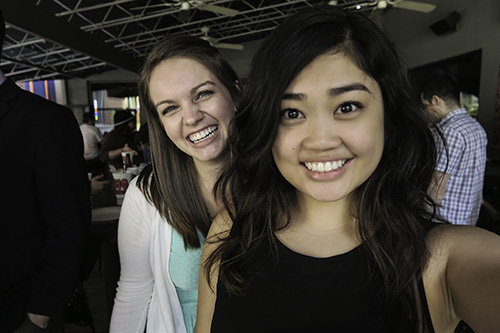
Molly Pace and Paula Mariano selfie at the ECE Illinois Student Awards Banquet when they were Illinois students. (Image courtesy of Paula Mariano.)
For instance, one lesson she learned early on was that although practice midterms were similar to the homework, the exams would be changed up a lot and not what she expected. "And that's something that you kind of have to get used to. You can't just be, 'Oh, if I'm fine on the practice exam; maybe there's a couple of topics missing, but if it's not on the practice exam, I won't be tested on it,' You most likely still will be!”
So after doing not-so-well on some midterms, Pace panicked, then quickly sought help. First she visited her major's advising office, then CARE (Center for Academic Resources in Engineering) in Grainger Library, and was able to turn things around by the second midterm. "It was about three to four weeks of really intense work," she reports. After that, she knew how hard she would have to work to succeed.
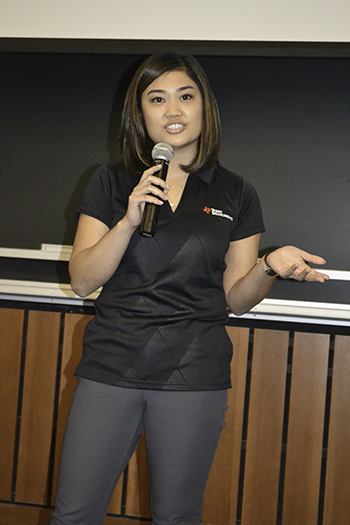
Paula Mariano shares about her experience as an Illinois engineering student during the opening session of WIE Orientation.
Mariano went through a similar experience. “One of the first classes that made me realize this wasn’t going to be a day in the park was the introductory class into semiconductor solid state physics,” she reports. “I think that I learned that I’m not just going to go along and get straight A’s from just attending lectures, but I have to push myself a little further. I think that was a transition from out of high school, that common mentality, ‘Oh, yea, I’ve done this before. I know how to study!’”
Mariano shares how she set about to undergo a paradigm shift: for one, she went to people who were doing well, and asked them, "‘Hey, is it ok if I sit down next to you while I’m doing my homework and ask you every now and then, whenever I struggle, if I think I’m doing something wrong?" From that point on,” she admits, “I felt a little bit more comfortable talking to other people about the questions I had. And then I went on further to talk to TAs, and then professors.”
Based on their own experiences, both ladies were quick to offer students advice, citing resources that had helped them thrive at Illinois. For example, one piece of advice offered continually throughout WIE Orientation, and which both ladies echoed, was community—to start working in groups early on. “It’s not a one-man show” Pace stresses. “You’re going to need help to get through this. Start that early and get used to that kind of collaborative feel.”
Mariano agrees: “Be collaborative with your classmates. A lot of you guys could be struggling together, and someone might understand point A, and you understand point B, and together you can make the complete picture.”
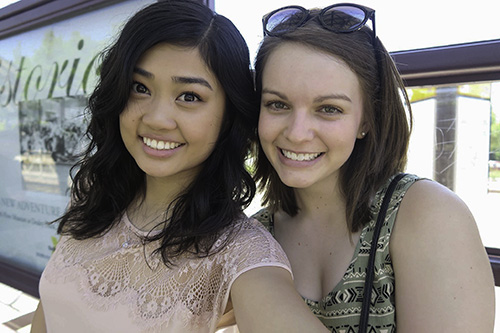
Paula Mariano and Molly Pace, who are currently roomies as they begin their working careers together at Texas Instruments in Dallas, TX. (image courtesy of Paula Mariano).
So both mentioned utilizing various resources that fostered collaboration. For example, Mariano got involved in Women in ECE RSO (registered student organization), “because they understood exactly what I was going through in one of the most male-dominated fields in engineering here, and we needed to be supportive of one another…they were a great community for me to join and be a part of.”
Both Pace and Mariano encouraged students that getting into study groups is key.
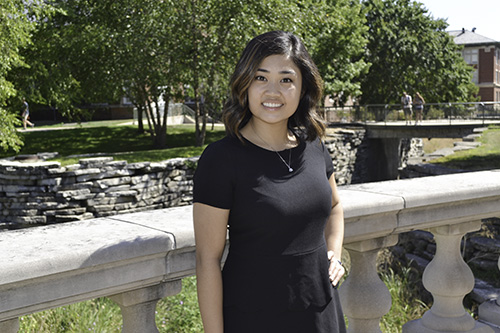
Paula Mariano on the south portico of Engineering Hall during the second day of the WIE Orientation.
Mariano made friends and formed a study group early on. In fact, she and the members of her group tried to schedule classes together. But if members of her group weren’t interested in taking a class she wanted to take, she saw it as an opportunity to meet new people, build more relationships, and create her own little study group. “I always talked to the people next to me the first couple of classes,” she says, with the idea of forming a study group since they would also be working on the same assignments.
Both fostered reciprocal, give-and-take relationships where they and a fellow-student would encourage and hold each other accountable. For example, Mariano formed a relationship with a girl she met during WIE Orientation who was also taking the ECE introductory class with her, “and we struggled together to get through that,” she admits. Although her friend was in industrial engineering, they had some core classes together, and Mariano says she “learned how to tutor her because industrial and electrical have different mindsets, and she helped me in other things as well.”
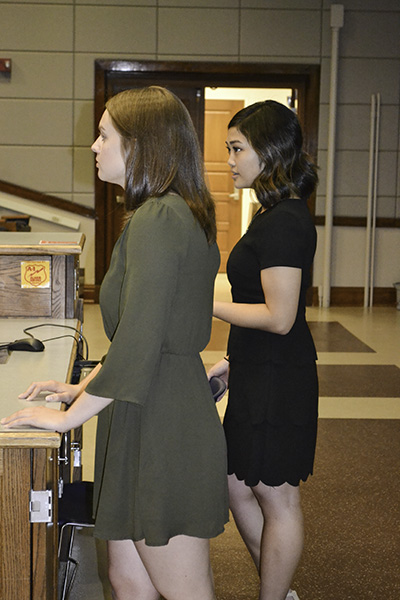
Molly Pace and Paula Mariano presenting their workshop on internships at TI at the recent WIE Orientation.
Similarly, Pace recalls “finding a few core friends who were more in the same position as me and ready to really study together.” She acknowledges the importance of “having that network to rely on and kind of keep us grounded,” then shares a scenario where a friend would be a positive influence on her, saying: “Yea, well, I was going to study,” to which she would respond: “Aw, man. She's studying; I'm going to study."
According to Pace, it wasn’t just freshman year that had challenges to be overcome. “Every year there was probably something,” she admits. “So sophomore year, it was the computer engineering classes that were completely new to me. I've never coded before, or seen code, so getting up to speed was definitely difficult. I'd Google, 'What is a terminal?' And next I had to Google, 'How to open a terminal.' So I was extremely lost at that time, kind of catching up there."
Plus, it didn't help that at that time, she'd had to listen to classmates brag about their experience, and all the apps they'd made, to which she'd reply, "'I don't actually know what you're saying.' So that was tough."
Other pieces of advice the two offer reaffirm several other resources that cropped up continually during WIE Orientation. One was office hours.
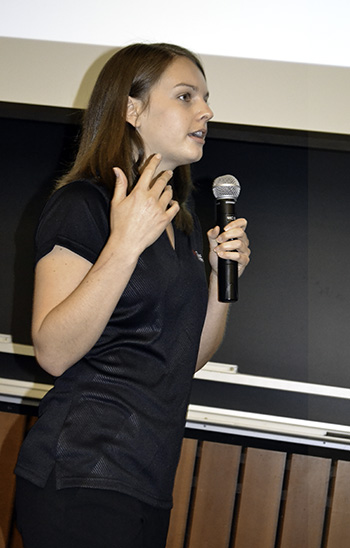
Molly Pace encourages the incoming Illinois freshmen during her keynote presentation at the WIE Orientation opening session.
“Start going to office hours,” Pace suggests. “Try to go to a lot, even if you’re there and maybe you’re done with the homework. Sometimes they’ll do example problems, or they’ll do the problem that you’ve already done, but it’s a totally different way of thinking about it, and you need to know that. So that can happen, where you get the right answer the wrong way, and you want to catch that early.”
Mariano also utilized office hours. “I was able to talk to the TAs, and any problems I had I was able to approach them, and they would explain things to me. And another resource I would suggest to use is your professors. They’re there to help you, and they want to be here to help you guys, and possibly push you to grad school if you’re inclined towards that, and they want to make sure that you succeed. They won’t think any less of you if you ask questions.”
Another resource Pace suggested is CARE “for getting those coaches and tutoring. Start going there early; start doing your homework there, and that’s one way to make friends in the class and then you could start studying together. They’re there; they’re kind of like-minded as you; they’re trying to get that work ethic going early.”
Pace also recommends studying with students in your classes who live in your dorm. “We would all go to the computer lab that is in the dorm, and we would work on homework together. And that was just nice. We didn’t have to leave the building. It was just easier. There were some really smart people, and we could all just kind of work together. I learned a lot from them.”
Both offer some pieces of advice which seem to be no-brainers, but might be related to the freshman propensity to assume college requires the same effort as high school. Mariano suggests: “Read the book! Don’t think that you’re going to slide by just by going to lectures and listening to whatever they teach you. There’s a lot more information that they cannot squeeze into just a 45-minute class. And a lot of the homework problems that you’ll be assigned will reference those points, and you don’t want to be picking and choosing some information; you want to get all the details you can to do well as an engineer.”
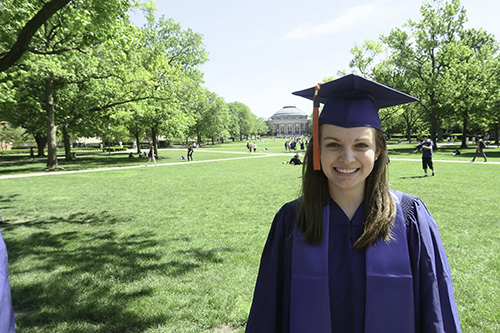
Molly Pace during Illinois' May 2016 graduation. (Image courtesy of Paula Mariano).
Pace offers some advice that she says she would have liked to have known when she started off: “Stay organized. So you have so many things due every day; you need to start writing them down so you don’t forget. Multiple times I would go into a lecture and realize I didn’t do the pre-lecture, and that’s a couple of free, easy points that I could have gotten that I missed.”
One final piece of advice both offered, not only to the freshmen, but all women in engineering at Illinois, is that they too can succeed
“I told some of the other students this. Just don't let anyone kind of try to bring you down or denigrate you because maybe you're starting out in Calc 1, maybe you did poorly, but they did excellently,” urges Pace. “People can really brag or try to bring themselves up. They can kind of play mind games with you, so just try to ignore them in classes; just worry about yourself. Who cares if they're getting straight A's. Just focus on yourself."
Mariano adds a further word of encouragement:

Paula Mariano during Illinois' May 2016 graduation. (Image courtesy of Paula Mariano).
“Don’t be discouraged. This is a difficult major; it’s hard. And the College of Engineering here at Illinois is highly ranked for a reason. You’re with top caliber people. And it’ll be hard, but you know you can do it. You have resources available to you, and if you utilize that, and keep your hopes up, you’ll be able to graduate with flying colors.”
While both women had known that Illinois is a good Engineering school, neither realized the prestige of an Engineering degree from Illinois until they hit the work world.
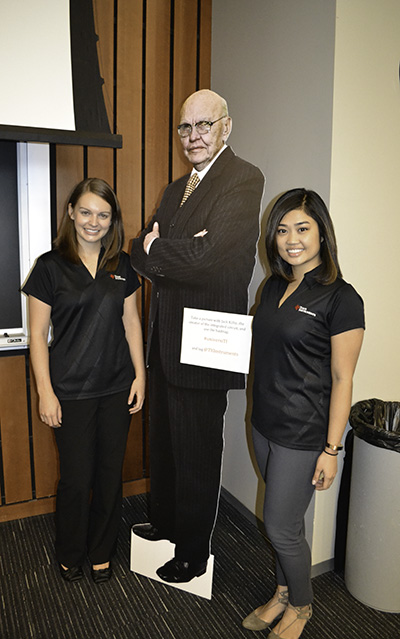
Molly Pace and Paula Mariano by a cardboard statue of Illinois alumn, creator of the integrated circuit, and TI great Jack Kilby.
“The University of Illinois is so widely known; I feel proud saying it whenever I introduce myself when someone asks me,” says Mariano. What makes it even more special is that both of her older siblings are Illinois graduates. “So it’s kind of a family thing now. My mom’s so proud, with us all being from the University of Illinois.”
“It’s really an honor; it’s humbling to think about all the people that have come from here, and have gone on to do such great things," Molly adds. "I almost kind of feel like I’m in this really exclusive club. I didn’t really realize that would happen. But you have these brilliant people that have also graduated. You know people are always kind of shocked: ‘Oh, you went to U of I?’ And that’s just such an amazing feeling. I didn’t think that I would be able to do it, and now, it’s just fantastic. It opens up so many doors, just because they know, ‘This is going to be a good engineer; they got through it!’”
Story and photographs (unless noted otherwise) by Elizabeth Innes, Communications Specialist, I-STEM Education Initiative.
For additional istem articles about WIE, please see:
- At WIE Orientation, Engineering Freshman Women Experience Campus, Build Community
- Cindy and Stephanie Richartz—Keeping It in the Illinois Engineering Family
- WIE Orientation 2015 Shows Female Engineering Freshmen the Ropes
For more related stories, see: Engineering; Illinois Legacies; Women in Engineering; 2017
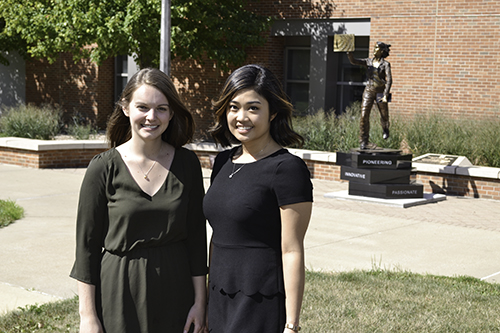
Molly Pace and Paula Mariano meet the Quintessential Engineer, the new female engineer statue on campus.













.jpg)
















